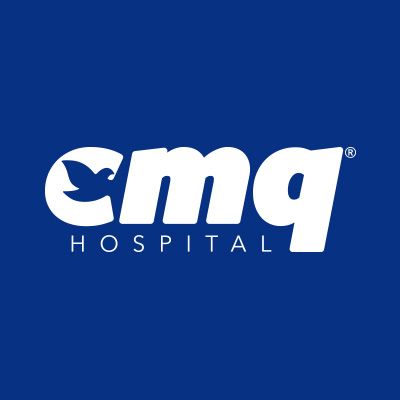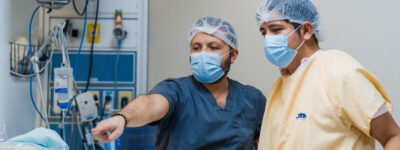Revolutionizing Cardiac Diagnostics: The Coronary Calcium Scan at Hospital CMQ
Coronary Calcium, the Preventive Imaging Study by CT Scan
The Coronary Calcium Score (CCS) is a non-invasive test that uses cardiac tomography to measure the amount of calcium in the heart’s coronary arteries. In recent years, the coronary calcium procedure has been boosted due to its ability to identify and measure the amount of calcium painlessly without using any contrast agents. As a result, physicians can more accurately evaluate a patient’s risk of developing heart disease and adapt prevention and treatment strategies.
The coronary calcium test is a crucial tool for evaluating the cardiovascular risk of atherosclerosis, a condition that can trigger serious cardiovascular events such as heart attack or stroke.
At Hospital CMQ, under the direction of our renowned specialist in Echocardiography and Cardiovascular Imaging Dr. Leonel Molina, we provide our patients with more in-depth and customized screening options for their heart health. Please keep reading this article and learn more about the Coronary Calcium Score, its characteristics, and benefits.
What is Coronary Calcium Score?
The Calcium score test is a non-invasive diagnostic procedure used to detect and measure the amount of calcium in the coronary arteries. Similarly, it provides calcium score levels that help physicians assess a patient’s risk for future cardiac events. In addition, the procedure is quick, usually takes less than 10 minutes, and requires no sedation or special preparations.
Also, this study is for people over the age of 40 with any of the following risk factors: Family history of heart disease
- Current or previous tobacco use
- High cholesterol levels
- Diabetes
- High blood pressure
- Overweight
- Neuompatia
- Sedentary lifestyle
- High-stress levels
Meet Our Team of Expert Coronary Calcium Specialists in Puerto Vallarta: Commitment to Patient Care and Advanced Diagnostics
At Hospital CMQ we are proud to have a team of highly trained specialists dedicated to the evaluation and treatment of cardiovascular diseases. Our multidisciplinary team stands out for its commitment to providing medical excellence using state-of-the-art technology to offer accurate diagnoses and effective treatments.
Expertise of Dr. Leonel Molina, Cardiologist in Puerto Vallarta
Among our distinguished specialists, Dr. Leonel Molina stands out as a leader in the field of cardiology, particularly in Echocardiography and Cardiovascular Imaging. His vast experience and deep knowledge in this field have contributed significantly to improving the cardiovascular health of our patients.
Dr. Molina also has an impressive track record in cardiology, having completed his academic training at some of the most prestigious institutions in the country. In addition, with more than 20 years of clinical experience, Dr. Molina has pioneered the implementation of Coronary Calcium Quantification as an essential tool for the early detection of atherosclerosis and cardiovascular risk assessment.
Schedule your appointment with Dr. Leonel Molina!
Call 322 226 6500 and book your space.
Benefits of the Calcium Score Test
Coronary calcium scanning offers numerous benefits. First, one of the most significant benefits is the ability to detect atherosclerosis in its early stages, even before symptoms occur. This allows preventive strategies to be implemented, reducing the risk of serious complications and improving long-term quality of life. Next, apart from its diagnostic value, is a noninvasive, highly convenient, and safe procedure that requires no prior or special preparation.
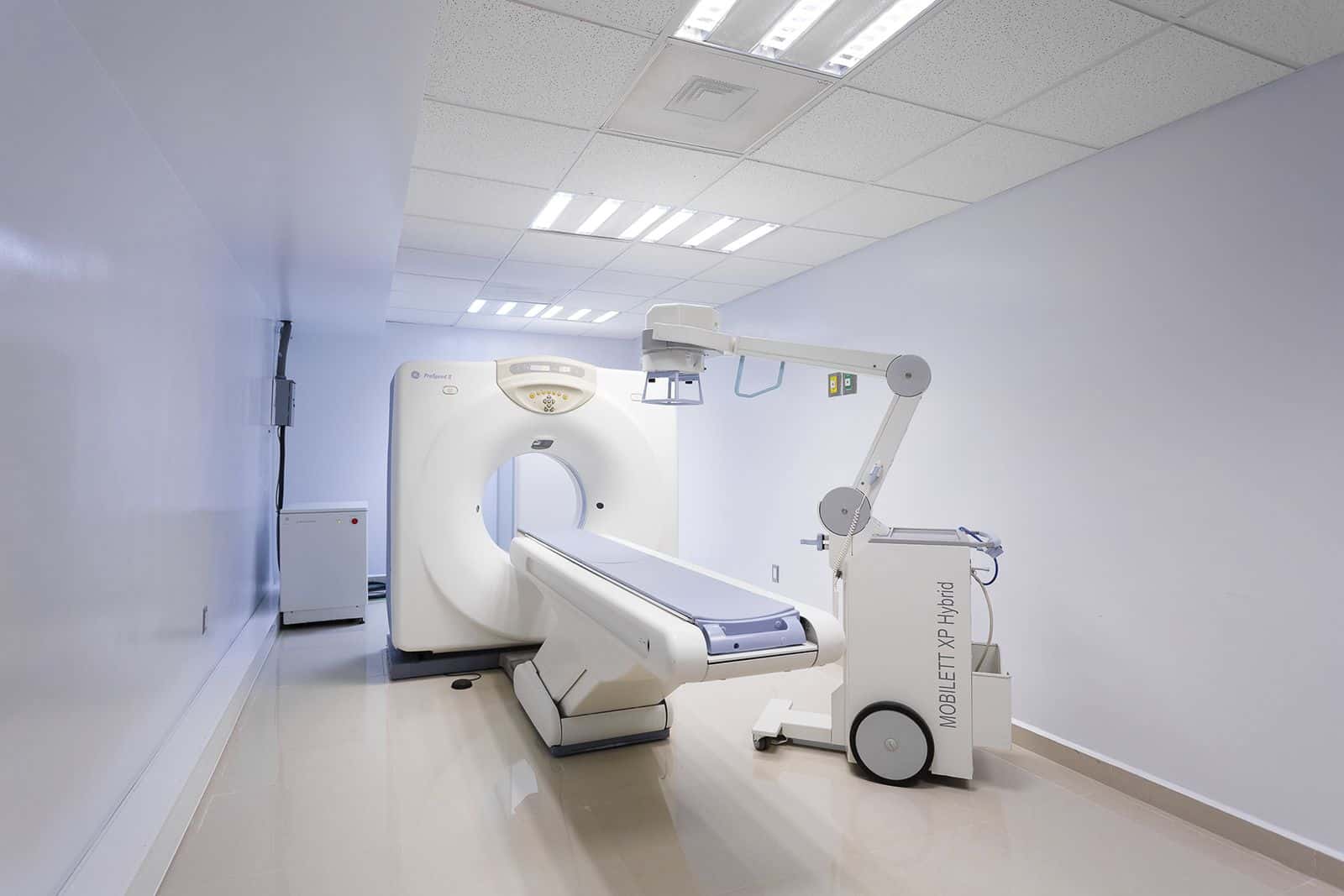
The Procedure Step by Step: What to Expect During and After the Scan
This Calcium Scan is a simple and non-invasive procedure that is performed in a few steps. First, upon arrival at the Hospital, you will be greeted by Dr. Molina who will escort you to the CT room. Next, you will be asked to lie down on the table. Also, electrodes will likely be placed on your chest to monitor your heart rhythm during the procedure.
During the scan, the table will move through the ring of the scanner, which will take detailed images of the heart and coronary arteries in a matter of minutes. You must remain still and try not to move too much. As mentioned earlier, the procedure is quick, usually taking less than 10 minutes, and is not painful. Once the scan is completed, you can resume your normal activities immediately. Finally, the results of the study will be analyzed by our specialist, who will interpret the images and calculate the calcium score, providing a clear assessment of your cardiovascular risk.
Understanding the Results: Significance of the Different Score Levels
The interpretation of Coronary Calcium results is based on the calcium score obtained from the scan. This score, known as the Agatston score, quantifies the total amount of calcium present in the coronary arteries. The results are categorized into different ranges to assess cardiovascular risk: “By measuring coronary calcium, an age-adjusted scale is obtained that allows us to assess the risk or probability that a patient may have a heart attack or cerebrovascular events. As it moves away from 0, it indicates a greater risk that a calcium plaque may be obstructing a coronary artery,” mentions Dr. Molina.
Therefore, understanding this information we can establish that a score of 0 indicates no calcium and a very low risk of coronary heart disease; a score between 1 and 100 suggests a minimal amount of calcium with a low to moderate risk; scores between 101 and 400 indicate a significant amount of calcium with a moderate to high risk; and scores above 400 indicate an extensive amount of calcium and a high risk of serious cardiac events.
The significance of these results is crucial for planning medical care. An elevated calcium score indicates the presence of atherosclerosis, which may require immediate surgical interventions. Similarly, physicians use this information to design personalized treatment strategies, which may include lifestyle changes, and lowering cholesterol and blood pressure.
Coronary Calcium Score Images: Explaining Your Results
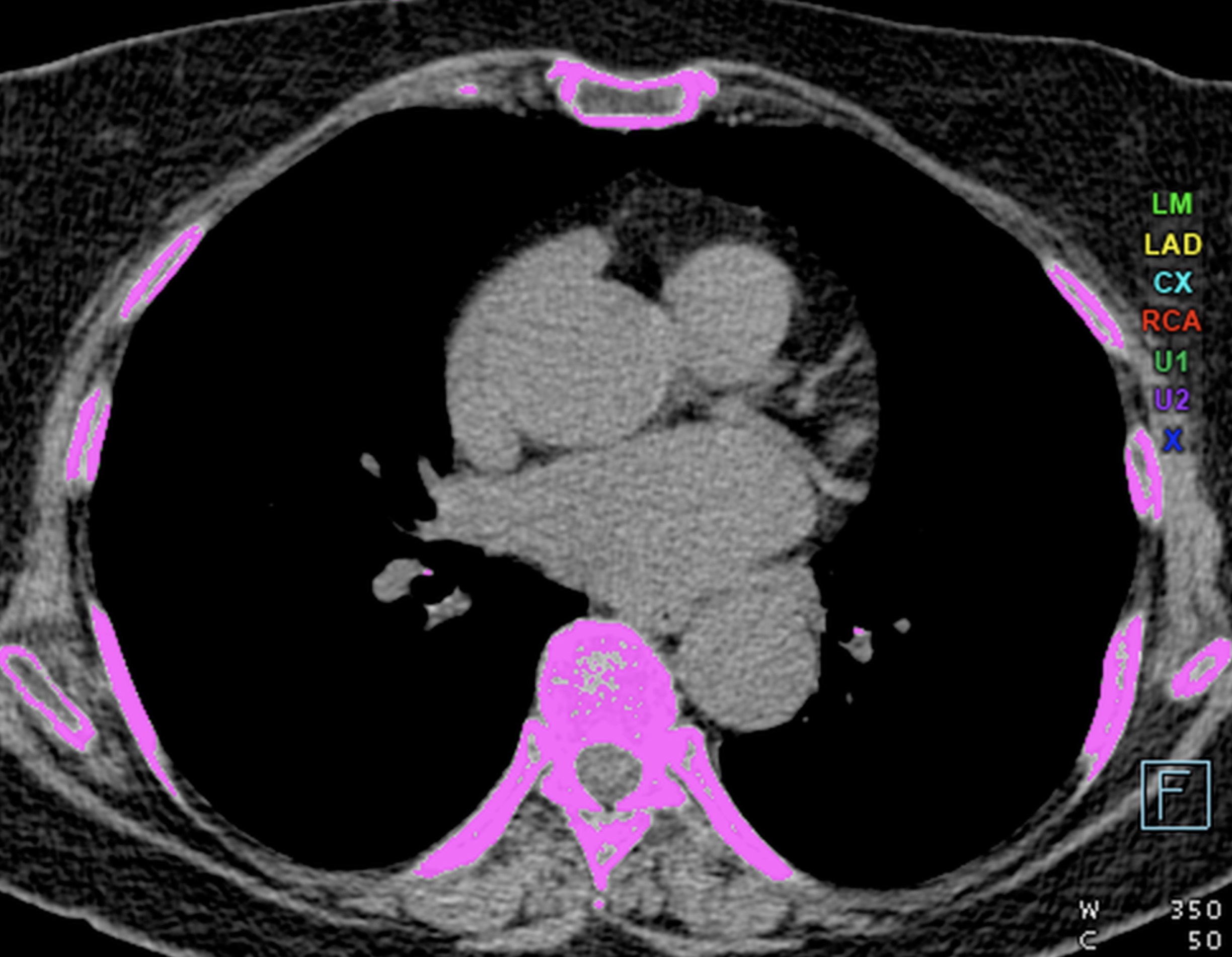
In this image, we can see a result of Coronary Calcium Score of 0. This patient has no calcium plaques in his arteries.

This image is of a patient with a Moderate Coronary Calcium Score. His results show a quantification of 398, which means that there is a moderate amount of calcium in the arteries.
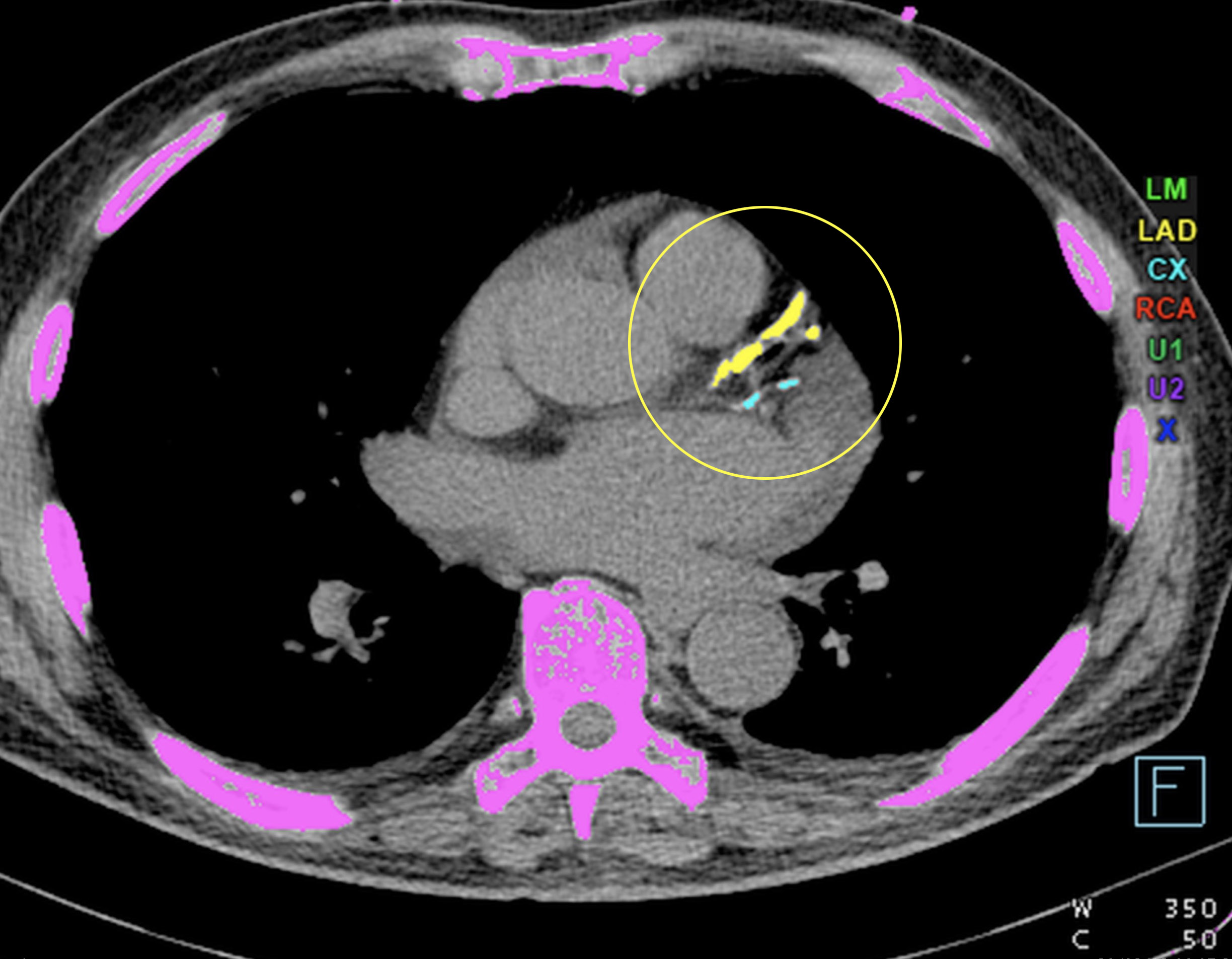
Severe calcium score greater than 400. In this image, we can see that the percentage of calcium present in the artery is greater than 90%. This means that calcium is obstructing the artery.
However, we would like to inform you that the quantification and interpretation of the Coronary Calcium Score should be performed by the imaging specialist. “It is of utmost importance to know the clinical scenario of the patient and combine it with other usual risk factors, which must be explained in detail so that the objective of the study is fulfilled,” concludes Dr. Leonel.
Why Choose Hospital CMQ for Your Coronary Calcium Scan?
At CMQ Hospital, our Coronary Calcium study not only uses the most advanced technology to provide accurate diagnoses but is also performed by a team of specialists led by Dr. Leonel Molina. By choosing us, you are assured of receiving a comprehensive and detailed evaluation of your cardiovascular health in a comfortable and safe environment.
Tu estudio de Calcio Coronario en Hospital CMQ
En el Hospital CMQ, nuestro estudio de Calcio Coronario no solo utiliza la tecnología más avanzada para ofrecer diagnósticos precisos, sino que también es realizado por un equipo de especialistas liderado por el Dr. Leonel Molina. Al elegirnos, te aseguras de recibir una evaluación integral y detallada de tu salud cardiovascular en un entorno cómodo y seguro.
Your Coronary Calcium Scan in Puerto Vallarta is available at Hospital CMQ Premiere and Hospital CMQ Riviera Nayarit.
Frequently Asked Questions of the Coronary Calcium Scan
A Coronary Calcium Scan is a CT scan that detects calcium deposits in the arteries, indicating atherosclerosis. Unlike other heart tests, it specifically measures the amount of calcium, providing a Calcium Score to assess heart disease risk.
Patients at risk of heart disease, such as those with a family history of heart diseases, high cholesterol, high blood pressure, diabetes, smoking, and obesity.
Yes, it is a safe procedure. It’s a non-invasive procedure that involves low-dose radiation, similar to standard CT scans.
Our experts mentioned that there’s no specific or special preparation for this procedure. However, some recommendations include:
- Avoid caffeine and smoking for 4 hours before the test.
- Wear comfortable clothing.
- No need to fast.
- Inform your doctor of any medication you are taking.
- Arrive early to your appointment.


